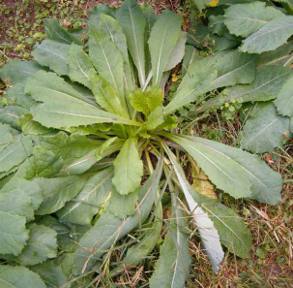 Lactuca virosa
Lactuca virosaWild Lettuce
This European native magic herb was referred to as "Titan's Blood" in ancient Greek manuscripts and many consider it, like regular lettuce, to be a Moon plant on account of its generally watery nature and white (bitter) sap. If you have encountered this plant, you know that it does not have the wateriness of its domesticated cousin, and its chemical relationship to other strongly Saturn plants like henbane indicates a Saturn association, especially when you consider the insignificant flowers. It also is often found growing wild in such Saturn-beloved places as roadsides (Saturn loves edges) and "waste places." This plant provides an incense aid for divination, especially when working with darker deities. For spellwork, it is an anti-aphrodisiac and hypnotic. Gather leaves when the plant is in flower and preferably at full Moon and dry for later use.
This herb
contains the
tropane hyoscyamine, much as the nightshades do,
but Lactucarium, an Eclectic preparation made from the
latex harvest from this
herb when it is flowering, is a sedating bitter that contains no
hyoscyamine. Its dried latex looks, tastes, and
smells similar to opium (more Moon here) and so
has been used to adulterate opium in the past,
which probably partially accounts for one of its common
names, lettuce opium.
In British herbalism, it is often combined with passionflower
and hops in equal parts and made into a tea for insomnia. 1/2-1
teaspoon of the herb mixture per cup is infused 15 minutes and 1/2
cup of the infusion drunk for chronic sleeplessness. Although
the very young leaves are edible, it is better to grow regular cultivated
lettuce for table use.
Be careful with this plant, as it is toxic in large quantities;
'virosa' means poisonous, as in 'virulent.' It can cause stupor
and has even caused death, but it is generally less dangerous
than various other baneful plants. This plant is also
known
as
strong-scented
lettuce, laitue vireuse, and acrid
lettuce. This is not the same as Lactuca scariola or
prickly lettuce, which is often sold in its place. Note that the
leaves of L. virosa are not lobed like those of L. scariola (see
pic of L. virosa plants from Harold's garden).
How to grow
wild lettuce: Do not cover
seeds - just press them into moist soil and water
to germinate in 7-14 days at 70F. Transplant seedlings
to rich, moist soil and full sun, spacing 2-3ft/60-90cm apart. This
is a biennial, which means in the first year it
will make a rosette of leaves, and in the second
year the flower stalk(s) will shoot up in early to mid
summer to 3-6ft/.9-1.8m and
produce seeds in late summer/early fall. If you're lucky, it will make
seeds the first year, but in our experience, this is
a two-year plant. It's hardy to zone 6 (-10F/-23C). This plant likes rich,
moist soil and reseeds so readily that it is
considered a weed in many areas.
General
growing info
Lactuca virosa
Wild Lettuce
50
seeds $4.00
Uses in
Witchcraft & Magick:
Divination
Moon & Saturn Herb
© 2000-2024 Alchemy Works; No reproduction without permission